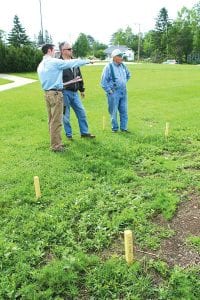The courthouse rain garden is getting a makeover.
The June 15 county board meeting brought a storm of criticism for the conservation project that was meant to be a showpiece of environmental responsibility. The rain garden, installed last year and still getting its roots into the ground, ended up being bigger and closer to the Veteran’s Memorial than some of the decision-makers had envisioned.
The county board wanted to respect the feelings community members expressed about the ragged appearance of the rain garden so near the memorial, but taking it out would cost the county about $17,000 because of an agreement requiring a penalty of 150% of the grant amount if the garden was not kept up for 10 years.
Soil & Water Conservation Technician Tristan Beaster, who headed the project, met with county Maintenance Director Brian Silence, American Legion Commander Don Wilson, and County Commissioner Bruce Martinson to discuss changes that, in Beaster’s words, “could be acceptable for everyone involved in the use of the courthouse lawn and Veteran’s Memorial area.” Beaster also met with conservation engineer Keith Anderson, Soil & Water Supervisor Joan Farnam, and Extension Director/master gardener Diane Booth on how a redesigned garden could be more aesthetically pleasing.
Beaster proposed eliminating the third and lowest tier of the garden and moving the second tier to the east of the first tier, closer to the courthouse building. The area around the garden would be smoothed down to the level of the lawn around it so it would have less visual impact. Such a design would still be able to capture one-quarter inch of storm water in a 24-hour period, another requirement of the grant.
Beaster estimated the cost at $5,000, $1,300 of which would be for sod. At the Memorial Day ceremony beside the Veteran’s Memorial, some people expressed dismay over the weeds around the perimeter of the garden where grass seed was struggling to establish itself.
The county board discussed Beaster’s idea at the June 22 county board meeting. Don Wilson was asked what he thought of it. “If you start this project,” he suggested, “keep an eye on it so it doesn’t get out of hand.”
Commissioner Sobanja asked what would be done with the fill that had been hauled in for the first garden design. Beaster suggested that it could be brought to the Recycling Center for people to use in their gardens, or it could be made available to the volunteers who worked on the project. Sobanja said maybe the Highway Department could use it.
Long-term maintenance of the garden should be minimal, Beaster said. He estimated a need for half an hour of weeding a month during the growing season, which could be done by Soil & Water staff or volunteers.
The whole idea of this rain garden, stated Soil & Water Supervisor Joan Farnam, is to take pollutants and filter them so they don’t enter Lake Superior. This new plan looks like it will be effective, she said.
This was also supposed to be a demonstration project, Commissioner Jim Johnson said. “Rain gardens are an important piece to keep Lake Superior clean,” he said. He wondered if they should think of it more like a retention basin that they decorate a little.
Theplants in the garden are specifically chosen for their ability to filter pollutants, Farnam said, but the project is meant to show people how to treat storm water and create a beautiful space at the same time.
The board unanimously passed a motion asking Beaster to nail down costs and formulate a firm plan for their review. “Thank you to Tristan,” Commissioner Bob Fenwick said. “The decision to do the rain garden was the board’s decision. …You need not take the brunt of the blame for this. This is not part of some environmental agenda.” Theproject was meant to be a demonstration project, he said.



Loading Comments